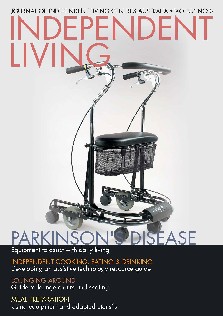
Publications
Independent LivingVolume 27 No 3
published in November 2011
Featured Articles
Parkinson's Disease
- Equipment to Assist with Daily LivingThe experience of Parkinson's disease (PD) is unique for each individual. The need or value of equipment must be individually assessed depending on the personís specific symptoms, activities, performed and carer availability.
Abilities vary during the day as PD medication takes affect or wears off. As a progressive degenerative neurological disorder, reassessment is required as the condition progresses. Many people are not ready to consider the future impact during an initial assessment. Basal ganglia dysfunction and lack of available dopamine in PD reduces the ability to do well-learnt motor skills or movement sequences. Simple daily activities that previously were performed automatically may become slower and more difficult to complete.
Meal Preparation
- Using Equipment and Adapted UtensilsMeal preparation is a common topic of enquiry at the Independent Living Centre. It has been important to familiarize staff with a number of products and alternatives that may help a client in this area.
This article analyses meal preparation before discussing particular equipment and alternative techniques that may assist an individual to complete meal preparation tasks independently.
Vehicle Modifications and Transport Needs
- Importance of Driving & TransportTravel helps to fulfil and facilitate many important life areas, including employment, family, care responsibilities, education, social engagements, shopping, and entertainment (Barkley, 2004).
The ability to drive and be mobile can promote greater independence, gain exposure to more opportunities, have greater efficiency in accomplishing various goals and enable a rich and varied social life (Musselwhite & Haddad, 2010; Barkley). Hence, a car provides more than just mobility. It has the potential to impact upon a personís quality of life associated with feeling part of society (Musselwhite & Haddad).
** Included in this article is a Vehicles Features Matrix.
Lounging Around
- Guide To Lounge Chairs and SeatingCommon problems that people can experience when sitting include: difficulty transferring into or out of the chair; back pain or aggravation of existing back pain; and difficulty operating a reclining lounge chair...
Lounge chairs are usually used while performing sedentary activities, such as reading a book, watching television, socialising or resting. When sitting in a lounge chair, the user usually adopts a more relaxed posture than when sitting in a dining or office chair. Some problems occur because lounge chairs are often too low and lack appropriate postural support. Sometimes the lounge chair can be modified to make it safer and more functional.
Independent Cooking, Eating and Drinking
- Developing an Assistive Technology Resource GuideThe independent Living Centre WA (ILCWA) frequently provides advice and information to clients about the wide range of Assistive Technology (AT) to support them in the kitchen. Through collected statistics, they were aware that the main client groups were adults and that the school aged demographic was largely unrepresented...
Many students in education support settings are taught cooking skills and many have issues with independent eating and drinking. Although aware of this disparity, the ILCWA had limited resources to better promote the use of at to school aged children in the areas of cooking, eating and drinking, despite the large emphasis on life skills programs within the school curriculum.
In 2010 the ILCWA received funding through Non-Government Centre Support (NGCS) to develop a resource guide in the form of a manual to assist all parties (teachers, aides, therapists, students and families) in selecting appropriate AT for students with disabilities to maximize their independence in food preparation, eating and drinking.
